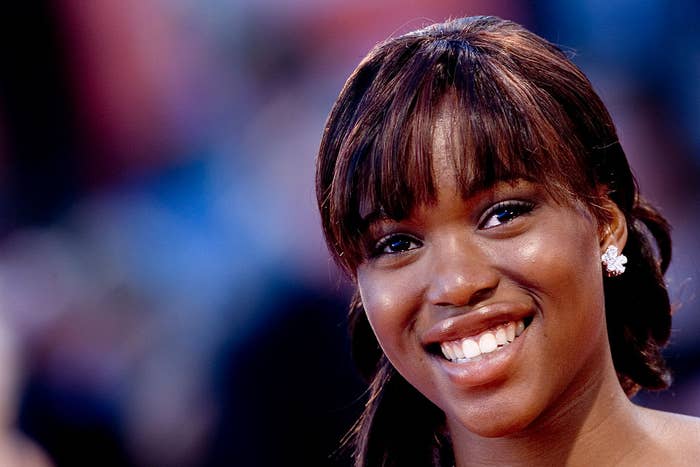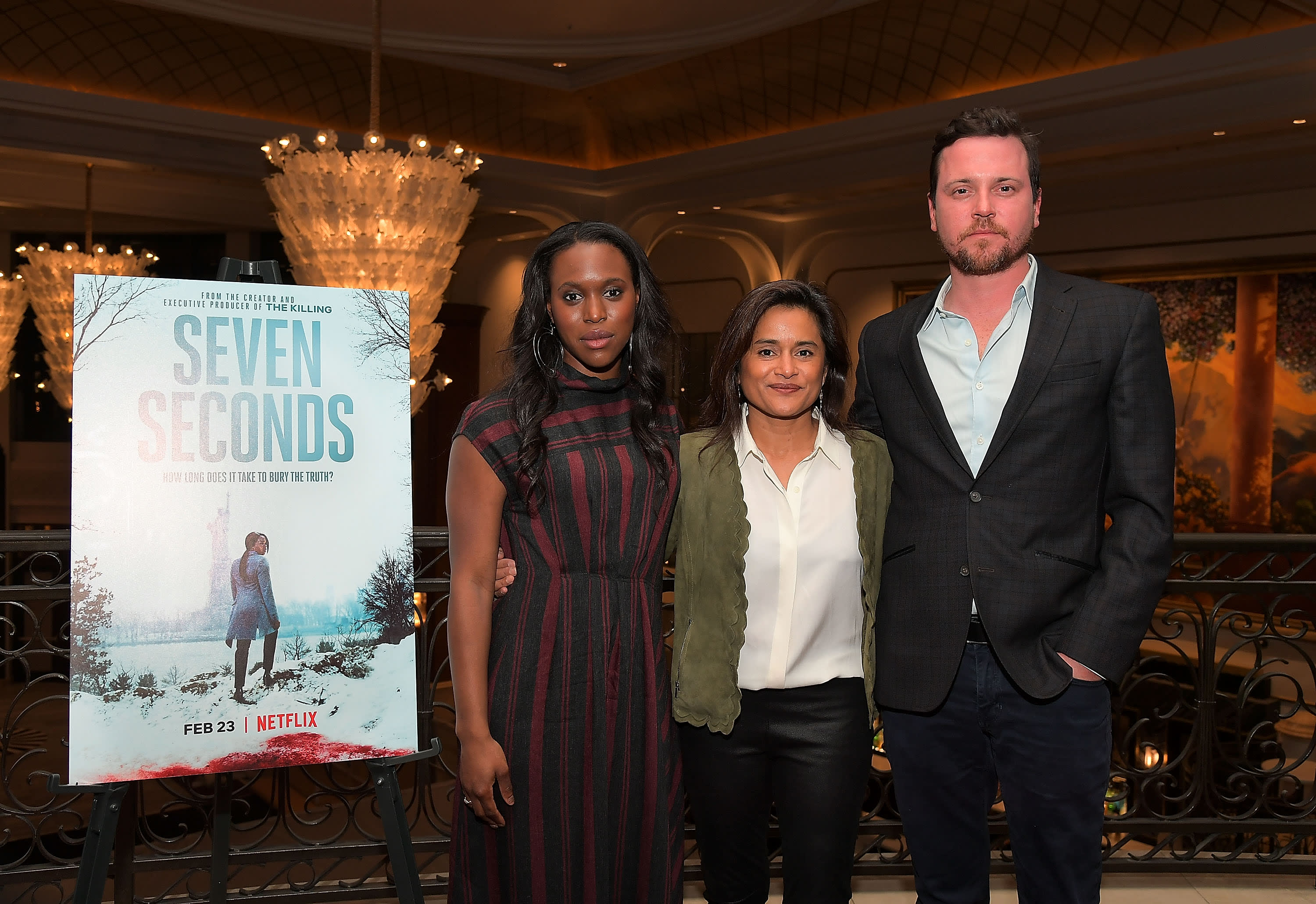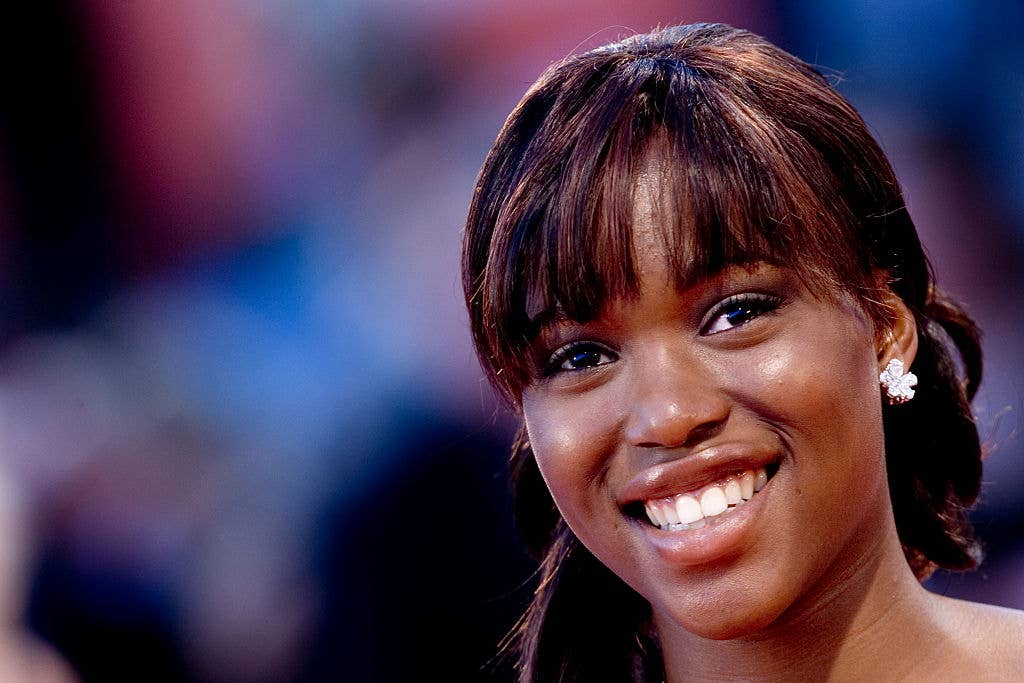
Seven Seconds is a show that will infuriate you. But that shouldn’t be a deterrent from watching when it premieres Feb. 23.
In this Netflix anthology produced by The Killing mastermind Veena Sud, a white rookie police officer hits a black teen with his squad car and leaves him for dead, allowing his superiors to cover it up. Assistant prosecutor KJ Harper, played by London-born actress Clare-Hope Ashitey, doesn’t know her colleagues are also the culprits, but the closer she gets to discovering the truth, the more desperate they become to keep her away.
As much as you want KJ to get justice for the victim and his parents (Regina King and Russell Hornsby), you also want to know how things will play out for her. It’s a testament to the performance Ashitey delivers. Her face is so expressive; her sighs exhale the weight of the world. Effectively, KJ—and the actress who plays her—will keep you watching, even as the story spirals further out of hand.
You might remember Ashitey, now 30, as Sara from the season 2 premiere of Master of None, the love interest whose number Dev loses when his phone is stolen. She also appeared in the ill-fated Jimi Hendrix biopic starring Andre 3000, and on the beloved UK drama Top Boy that Drake stans for. Ahead of the release of Seven Seconds, Ashitey stopped by Complex to discuss why the series matters, crossing over to America, nearly giving up acting, and the Master of None ending that almost was.
What attracted you to this project and the role in particular?
Reading it and understanding that KJ and actually all of the other characters are not one thing or another—because nothing ever is. There’s never just black and white. There’s a billion shades of gray in between and we all exist somewhere on that spectrum. Seeing her move around in that spectrum and keep changing and trying to tame one thing but end up over here... I just found really attractive in terms of wanting to portray that character because those are struggles that we all go through, and there’s a comfort in it, isn’t there? In seeing in art and in creation something that reflects your life and you going, “Well, if someone else has written this on a page then it’s not just me. It is real.”
I think at first blush Seven Seconds might seem similar to Shots Fired, a racially charged police drama that you were also in. What would you say to somebody who might dismiss this as the same thing?
I understand that. But what would I say is that we’re trying to reflect real experiences that African-Americans in this country have every single day and there isn’t just one person going through this; there are whole groups of people and tens of thousands of people going through this all of the time and all of their stories are equally valid and equally worthy of examination. Just because one person’s story has been reported in the paper, when something happens the next day it doesn’t mean that that person’s story means any less.
I actually think it’s helpful to continue to tell stories about what’s going on because it widens the dialogue, and until this issue is no longer an issue—which hopefully will be at some point in my lifetime—we should keep talking about it. I hope people keep making TV shows and series, writing books, making art about this issue because we need to keep talking about it because it’s happening. And I don’t think there’s any person who has experienced this who would be like, “Oh, yeah, it’s cool, there’s like one TV show about this. We shouldn’t make anymore.”
I hope people keep making TV shows and series, writing books, making art about this issue because we need to keep talking about it because it’s happening.
Seven Seconds is intended to be an anthology. To your knowledge, will it be like True Detective, where each season has a different cast?
The short answer: I have absolutely no idea. No one tells actors anything; we're always the last people to find out (laughs). We had a great creative team on this and I’m sure they have a lot of different ideas floating around, so we’ll see. I have no idea if KJ Harper will reappear. If she does—great. If she doesn’t, I'm still excited to see what they come up with.
A role that a lot of people know you for is the 2006 dystopian film Children of Mendirected by Alfonso Cuarón. You were only 19 at the time, but a lot of headlines made it seem like you had quit acting after that.
A lot of people ask me why after Children of Men I didn’t just move out to L.A. [from London] and keep going but the short answer is that I didn’t feel like I could. I felt like I had a lot of growing up to do and I felt like it would be too hard to do that growing up in this industry and on my own and without my support network, ’cause I’d be so far from home.
Also, I really wanted to go to university, and I knew I didn’t want to study acting because I wasn’t sure it was what I wanted to do. So I studied anthropology instead, and I’m very happy that I did that. I went back into my own age group and people who were at the same stage of life to me and some of my closest friends now I made while I was at university. Who knows where I would be if I’d just decided after Children of Men to keep going, but I don’t regret it at all.
So after school was when you refocused on acting?
After I finished university and started going to auditions again, and I also did a bunch of other jobs. I worked in the insurance industry, the digital media industry; I worked in a financial services company for three years. And in between them I would do some theater and then go back to working in an office and then did a film and then would like go back...
You were really trying to figure it out.
Yeah, I was really trying to figure out what on earth I was doing or where I was going. And then in 2014 I got to a point where I really had to make a decision. I wasn’t sure if I could deal with the uncertainty because there is so little control over your own destiny in this industry and it’s up to so many other people who decide based on arbitrary factors whether you’re right for this thing or the other. I got to a point where I was like I want to succeed at something in my life, and maybe acting isn’t the thing.
And then I just had a moment where I thought, I’ll just take a little leap of faith, and I quit my job and went, I’m going to just try and see if it works out. And now I’m here, so it went alright.

Is the goal for most actors in the UK to try to cross over to America?
I think a lot of people have that goal, much because there's a lot more work here, and it just feels like the place where you should be if you want to work, but I never really had that as an automatic thing that I wanted to do. It’s a smaller industry [in London]; it’s a different industry. I love working at home—I think we make some really great shows, and I’m happy working either place. If I only worked in England for the rest of my life I wouldn’t feel like I failed.
I saw that you were on a couple episodes of Top Boy, a UK show that is being revived for Netflix. What do you think is the appeal of it?
Top Boy for some people was very controversial, because it seemed to be portraying black people in a certain light that they thought to be stereotypical. However, what I would say is that the writer went and lived in Hackney in East London for a long time and did his research really well. And though it does seem to be leaning on a certain stereotype of black people it is showing one asset of how some people live. That is some people’s experience and actually I think they show them as quite nuanced characters without just going, “Well, this person is a gangster and this person is a bad guy and that’s it.” Let’s look at what their daily life is like, let’s look at how they think about things and feel about things is an interesting way to treat something that is real. I don’t think that we should shy away from the negative or the positive. And I think that that is an interesting story to tell and I’m excited to see what Netflix does with it.
Speaking of Netflix, I heard there was an alternate ending to Master of None where your character ended up with Dev. Did they actually shoot it?
Yeah, I think there was talk of an alternate ending, but we only ever shot it that one way. But it was such a fun show to shoot!
Seven Seconds premieres Feb. 23 on Netflix.

